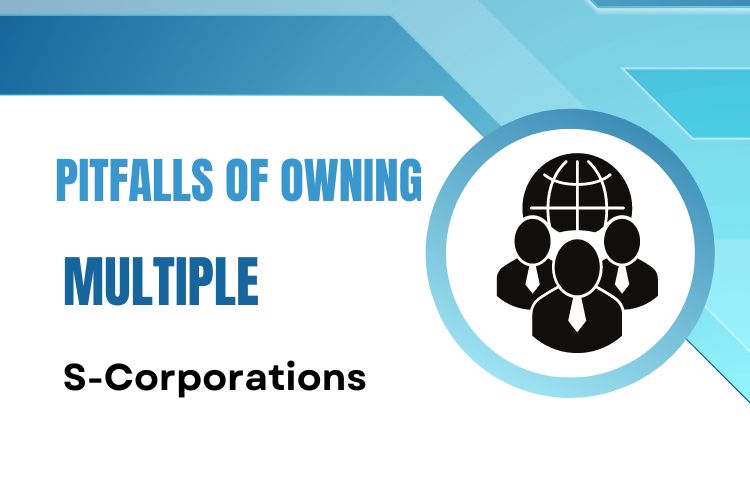As a business owner, you might be tempted to create multiple S-Corporations for various ventures or to segment your business activities. This method would be suitable from a strategic point of view.
Still, it usually ends up being too complicated and has a lot of negative consequences. One S-Corporation is typically sufficient for most business owners, and here’s why.
Understanding the S-Corporation Structure

Small business owners often choose an S corporation for its liability protection and pass-through taxation, which allows income, losses, deductions, and credits to be reported on the shareholders’ tax returns.
However, the benefits of an S-corporation can be overshadowed by the drawbacks of operating multiple entities of this kind.
Consequences of Multiple S-Corporations

1. Increased Administrative Burden:
Each S-Corporation requires separate record-keeping, tax filings, and state and federal regulations compliance. This can quickly become too much, especially for small business owners needing more resources to handle many entities effectively.
2. Higher Professional Fees:

With multiple S-Corporations, you’ll likely incur increased costs for accounting, legal, and tax advisory services.
Every entity will require its financial statements and tax returns, which can accumulate in terms of professional charges.
3. Complicated Tax Planning:
Owning multiple S-Corporations can make tax planning more complex. You’ll need to navigate inter-company transactions, allocation of income and losses, and potential concerns related to the IRS’s passive activity loss rules.
4. Increased FICA Obligations Due to Reasonable Compensation Requirements:

One of the most significant financial drawbacks is running separate reasonable compensation payrolls for the same owner across different S-Corporations.
S-Corp shareholders actively involved in the business must pay themselves reasonable wages, subject to FICA taxes (Social Security and Medicare) as mandated by the IRS.
If you own multiple S-Corps, you must pay yourself a reasonable salary from each entity, potentially leading to higher FICA tax liabilities. This is because the wages from each S-Corp are added together, which can make your income higher than the Social Security wage base limit.
This means you have to pay more Medicare tax.
5. Potential IRS Scrutiny:
The IRS may scrutinize the structure of multiple S-Corporations, especially if it appears that the entities are being used to manipulate income and payroll taxes.
This may result in audits, penalties, and interest if the IRS finds that the structure lacks legitimate business justifications.
6. Reduced QBI Deduction Benefits:

The Tax Cuts and Jobs Act introduced the Qualified Business Income (QBI) deduction, which enables eligible taxpayers to deduct up to 20% of their QBI from an S-Corporation.
Operating multiple S-corporations can complicate the calculation and diminish the overall benefit if the taxable income thresholds and phase-outs are not managed effectively.
The Case for a Single S-Corporation

A single S-Corporation can streamline business operations, reduce administrative overhead, and simplify tax obligations.
You will have a better idea of how your business is doing financially, and you can focus on growing it without worrying about managing several different companies.
Moreover, with only one S-Corporation, you can optimize your salary to balance reasonable compensation requirements with tax-efficient distributions, minimizing your overall FICA tax burden.
You’ll also have an easier time maximizing the QBI deduction and other tax planning strategies.
Conclusion
Although there are situations where having multiple S-corporations may be justified, most business owners find that the simplicity and efficiency of a single S-corporation are more advantageous than the perceived benefits of having multiple entities.
Before establishing more S-Corporations, seek advice from a tax expert to comprehend the consequences and consider other approaches to reach your business objectives without the increased complexity and expenses.
Remember, when it comes to S-Corporations, less is often more.

